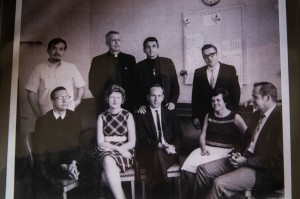 Br. David Darst was a high school teacher in St. Louis when he became involved with a group that would come to be known as the Catonsville Nine. Br. David taught against the immorality of the Vietnam War to his students, who, in turn, urged him to take action. Darst soon met others whose mentalities were in alignment with his own, and joined the group in an effort to resist the draft and protest the war. On May 17, 1968, a group of nine Catholics participated in an act of civil disobedience, marching into the Selective Services Office No. 33, located in Catonsville, Maryland.
Br. David Darst was a high school teacher in St. Louis when he became involved with a group that would come to be known as the Catonsville Nine. Br. David taught against the immorality of the Vietnam War to his students, who, in turn, urged him to take action. Darst soon met others whose mentalities were in alignment with his own, and joined the group in an effort to resist the draft and protest the war. On May 17, 1968, a group of nine Catholics participated in an act of civil disobedience, marching into the Selective Services Office No. 33, located in Catonsville, Maryland.
The group intentionally burned draft records using homemade napalm--made using a recipe from The Special Forces Handbook published by the US government, an act representing the horrors of the war. Fr. Daniel Berrigan, one of the leading nine, wrote, "Our apologies, good friends, for the fracture of good order, the burning of paper instead of children. . . ." The faithful group considered their act of civil disobedience one of conscience, reasoning that napalm had been used to kill Vietnamese soldiers "for reasons unclear to most thoughtful men." wrote Br. David. When asked to comment on the action, Br. David responded, "I wanted to do a tiny bit to stop the machine of death I saw moving." Everyone who participated in the social action was arrested and, after a meticulous, highly publicized trial, sentenced to prison. Br. David was sentenced to a two-year term, a term he would never serve. Br. David was killed in a car accident on October 30, 1968. Fr. Daniel Berrigan , while serving his sentence, wrote a play about the group and their tribulations called, The Trial of the Catonsville Nine. A film version of this was later produced by Gregory Peck in 1972.
